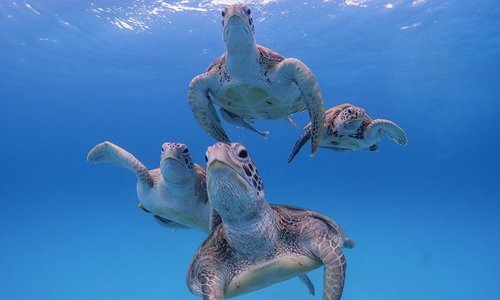Deserted Thai beaches lure rare turtles to build most nests in 20 years
Source:Reuters Published: 2020/4/20 19:38:41
Thailand has found the largest number of nests of rare leatherback sea turtles in two decades on beaches bereft of tourists because of the coronavirus pandemic, environmentalists say.

In Thailand, with 2,765 infections and 47 deaths, travel curbs ranging from a ban on international flights to an appeal to citizens to stay home have brought a collapse in tourist numbers but freed up the beaches for wildlife.
The 11 turtle nests authorities have found since November 2019 were the highest number in 20 years, said Kongkiat Kittiwatanawong, director of the Phuket Marine Biological Center.
"This is a very good sign for us because many areas for spawning have been destroyed by humans," he told Reuters. No such nests had been found for the previous five years.
"If we compare to the year before, we didn't have this many spawn, because turtles have a high risk of getting killed by fishing gear and humans disturbing the beach."
Leatherbacks are the world's largest sea turtles. They are considered endangered in Thailand and listed as a vulnerable species globally by the International Union for Conservation of Nature.
They lay their eggs in dark and quiet areas, scarce when tourists thronged the beaches. People have also been known to dig into their nests and steal eggs.
Late in March, staff at a national park in the southern province of Phanga Nga bordering the Andaman Sea found 84 hatchlings after monitoring eggs for two months.
Newspaper headline: Deserted Thai beaches lure rare sea turtles

The green sea turtles look like they are recreating a scene from the film Finding Nemo as they swim towards the camera whilst traveling in the East Australian Current, near Redang Island, Malaysia. Photo: VCG
From wild boars patrolling the Israeli city of Haifa to deer venturing into London suburbs, virus closures are drawing wildlife into the abandoned streets of many cities.In Thailand, with 2,765 infections and 47 deaths, travel curbs ranging from a ban on international flights to an appeal to citizens to stay home have brought a collapse in tourist numbers but freed up the beaches for wildlife.
The 11 turtle nests authorities have found since November 2019 were the highest number in 20 years, said Kongkiat Kittiwatanawong, director of the Phuket Marine Biological Center.
"This is a very good sign for us because many areas for spawning have been destroyed by humans," he told Reuters. No such nests had been found for the previous five years.
"If we compare to the year before, we didn't have this many spawn, because turtles have a high risk of getting killed by fishing gear and humans disturbing the beach."
Leatherbacks are the world's largest sea turtles. They are considered endangered in Thailand and listed as a vulnerable species globally by the International Union for Conservation of Nature.
They lay their eggs in dark and quiet areas, scarce when tourists thronged the beaches. People have also been known to dig into their nests and steal eggs.
Late in March, staff at a national park in the southern province of Phanga Nga bordering the Andaman Sea found 84 hatchlings after monitoring eggs for two months.
Newspaper headline: Deserted Thai beaches lure rare sea turtles
Posted in: ASIA-PACIFIC